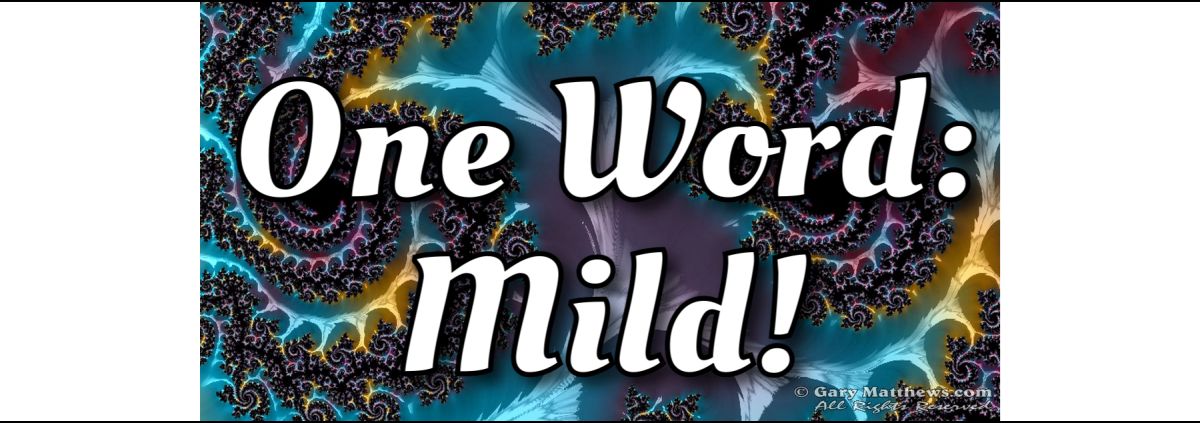Cheri and I were with a group of fellow Peace Corps volunteers in Grenada. The year was 1989. With us (because we were guests in his office) was an American career diplomat.
This gathering happened (coincidentally) at a time when most of the volunteers were dismayed by news of a recent political appointment in Washington. How – they wondered – could the US President have named so-and-so to such-and-such a post? (I don’t recall the who or the what.)
Their anger feeding on itself, the volunteers’ rhetoric grew more bitter, more fiery, more acidic. I don’t recall exact words. Probably those words included “stupid”, “crazy”, and “idiotic” – ot worse. There was a scattering of profanity.
Our diplomat host wasn’t thrilled by the selection either. During a lull in the invective, he remarked:
“Well, the merits of this appointment are less than immediately obvious.”
Of all the reactions that evening, our host’s was the most diplomatic. Certainly the most tactful. By far the least angry. Perhaps, as an employee and representative of the US government, he was rightly reluctant to criticize his boss. (Even though his measured words made it clear he felt very much like the volunteers.)
There was, however, one more thing:
Today, more than a quarter-century later, his is the only comment I remember word-for-word!
This seasoned diplomat’s mild, understated response made the deepest, most long-lasting impression. What can we draw from this?
Bahá’u’lláh, famous for the lasting impact of his own words, gives advice on how to make one’s speech “impressive and penetrating” so as to “exert its influence”:
“One word may be likened unto fire, another unto light, and the influence which both exert is manifest in the world. Therefore an enlightened man of wisdom should primarily speak with words as mild as milk, that the children of men may be nurtured and edified thereby … One word is like unto springtime causing the tender saplings of the rose-garden of knowledge to become verdant and flourishing, while another word is even as a deadly poison.” (emphasis added)
Pondering this advice, I performed a thought experiment: Suppose I had been in favor of the appointment that had the other volunteers so upset? What if I had approved of it – felt it had merit?
In fact, I didn’t. I was as appalled at that time as anyone else. But that makes no difference to our thought experiment. What if I had felt differently? Whose words then would most likely have swayed my opinion?
The obvious answer is those of the diplomat.
The problem with scorching denunciation is that it slams the door to conversation. It leaves no room for growth or movement. If I had liked the appointee in question, the accusatory name-calling would only have hardened my opinion.
By mildly observing that the appointment’s “merits” weren’t “immediately obvious”, the diplomat didn’t accuse anyone of anything. If I had liked the nomination, his reaction wouldn’t have made me feel stupid. It would have served as an invitation to (a) think about the merits (or lack thereof), and (b) talk with him about them.
I might or might not have changed my mind. But I would, at least, have been more open to doing so. I would at least have thought about my position, and his.
That is the power of mild-as-milk speech: It opens doors. By opening doors, it opens minds. Inflammatory accusations slam them both shut.
Do you want your words to break down opposition and have a lasting impact? Instead of making them tougher and more forceful, consider softening.
Don’t go wild. Go mild!
(This article is part of my series on words that are #worth1000pictures.)


6 responses to “One Word: Mild!”
‘Abdu’l-Bahá’s response to the evangelist in London who verbally attacked and tried to convert Him was, as I recall, “You try your way and I’ll try Mine.”
I’ve often said when confronted with a totally ridiculous statement, “That’s very interesting. Would you like to hear a different perspective?” The answer is generally some form of no, but tension is diffused.
Your reply diffuses tension, John, because it demonstrates respect for the person making the statement. It shows a willingness to listen and to discuss. And although it’s true that the answer “is generally some form of no”, I’m amazed how often it’s yes. At least in the sense of reciprocal willingness to talk.
Sometimes, too, I find myself coming around to partial (or even complete) agreement with the “totally ridiculous statement”. I really like this outcome because I’m lazy: Expanding my own horizons is so much less work than the (typically futile) task of trying to expand someone else’s.
There was a woman in our community who used to make the most ridiculous recommendations. However, when we consulted on how to phrase answers, we often unearthed a real problem that she had identified, but stated in a clumsy and obscure manner. Even in the world of right and wrong I heard someone advise listening those who disagreed with you.”Because, they just might be right.”
Gary, your go mild not wild piece is outstanding. We had a devotional gathering here last night of about 9 of us, and it was a smash when I read it aloud. So timely, so wonderfully told with its very vital truth. 🙂
Thanks, Phyllis. That reminds me — Marzieh Gail once told me the Persians have a saying: “Fire the cannon softly.” I always assumed that that applied to bombshell news (as in, announce it casually). But thinking about the whole mild-not-wild idea helps me see it in that light, too. That is, mild speech, properly used, can create or intensify its own bombshell effect.
Thanks for adding that Marzieh Gail anecdote, Gary. 🙂